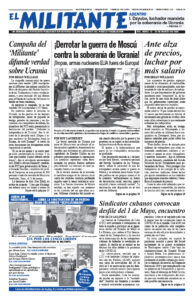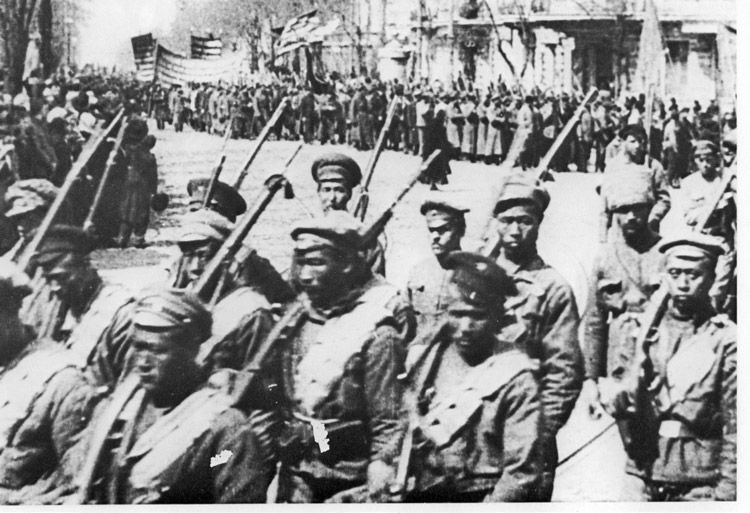As Ukrainian working people defend their country’s sovereignty, arms in hand, against Moscow’s invasion, this excerpt from Lenin’s Final Fight: Speeches and Writings 1922-23 is a special feature explaining why communists support Ukrainian independence. The book describes how V.I. Lenin, the central leader of the world’s first socialist revolution, led a political battle within the Bolshevik Party to continue the internationalist proletarian course that brought workers and peasants to power in October 1917. At stake was how former oppressed peoples of the czarist “prison house of nations” could join the Soviet Union as equals. After Lenin’s death, a rising bureaucracy within the state and party led by Joseph Stalin overturned Lenin’s program in a bloody political counterrevolution. The excerpts are from material Lenin sent to the Political Bureau and to a party congress defending his communist position. Copyright © 1995 by Pathfinder Press. Reprinted by permission.
October 6, 1922
I declare war to the death on Great Russian chauvinism. … It must be absolutely insisted that the union Central Executive Committee should be presided over in turn by a Russian, Ukrainian, Georgian, etc.
Absolutely!
Yours,
Lenin
December 30, 1922
It is said that a united apparatus was needed. Where did that assurance come from? Did it not come from that same Russian apparatus which, as I pointed out in one of the preceding sections of my diary, we took over from tsarism and slightly anointed with Soviet oil? …
[T]he apparatus we call ours is, in fact, still quite alien to us. It is a bourgeois and tsarist hodgepodge. There has been no possibility of getting rid of it in the course of the past five years, given the lack of help of other countries and given that we have been “busy” most of the time with military engagements and the fight against famine.
It is quite natural that in such circumstances the “freedom to secede from the union” by which we justify ourselves will be a mere scrap of paper, unable to defend the non-Russians from the onslaught of that really Russian man, the Great Russian chauvinist, in substance a rascal and a tyrant, such as the typical Russian bureaucrat is. There is no doubt that the infinitesimal percentage of Soviet and sovietized workers will drown in that tide of chauvinistic Great Russian riffraff like a fly in milk. …
Were we careful enough to take measures to provide the non-Russians with a real safeguard against the truly Russian Derzhimorda?* I do not think we took such measures, although we could and should have done so.
I think that Stalin’s haste and his infatuation with pure administration, together with his spite against the notorious “nationalist socialism,” played a fatal role here. In politics spite generally plays the basest of roles. …
Here we have an important question of principle: How is internationalism to be understood?
December 31, 1922
[A]n abstract presentation of the question of nationalism in general is of no use at all. A distinction must necessarily be made between the nationalism of an oppressor nation and that of an oppressed nation, the nationalism of a big nation and that of a small nation.
In respect of the second kind of nationalism we, nationals of a big nation, have nearly always been guilty, in historic practice, of an infinite number of cases of violence; furthermore, we commit violence and insult an infinite number of times without noticing it. It is sufficient to recall my Volga reminiscences of how non-Russians are treated; how the Poles are not called by any other name than Polyachishka, how the Tatar is nicknamed Prince, how the Ukrainians are always Khokhols and the Georgians and other Caucasian nationals always Kapkasians.
That is why internationalism on the part of oppressors or “great” nations, as they are called (though they are great only in their violence, only great as Derzhimordas), must consist not only in the observance of the formal equality of nations but even in an inequality, through which the oppressor nation, the great nation, would compensate for the inequality which obtains in real life. Anybody who does not understand this has not grasped the real proletarian attitude to the national question; he is still essentially petty bourgeois in his point of view and is, therefore, sure to descend to the bourgeois point of view.
What is important for the proletarian? For the proletarian it is not only important, it is absolutely essential that he should be assured that the non-Russians place the greatest possible trust in the proletarian class struggle. What is needed to ensure this? Not merely formal equality. In one way or another, by one’s attitude or by concessions, it is necessary to compensate the non-Russians for the lack of trust, for the suspicion and the insults to which the government of the “dominant” nation subjected them in the past. …
The Georgian [Stalin] who is disdainful of this aspect of the question, or who carelessly flings about accusations of “nationalist socialism” (whereas he himself is a real and true “nationalist socialist” and even a vulgar Great Russian Derzhimorda*), violates, in substance, the interests of proletarian class solidarity, for nothing holds up the development and strengthening of proletarian class solidarity so much as national injustice. “Offended” nationals are not sensitive to anything so much as to the feeling of equality and the violation of this equality, if only through negligence or jest to the violation of that equality by their proletarian comrades. That is why in this case it is better to overdo rather than underdo the concessions and leniency towards the national minorities. That is why, in this case, the fundamental interest of proletarian solidarity and consequently of the proletarian class struggle requires that we never adopt a formal attitude to the national question, but always take into account the specific attitude of the proletarian of the oppressed (or small) nation towards the oppressor (or great) nation.
Lenin
* Derzhimorda, a policeman in the play The Government Inspector by Russian writer Nikolay Gogol, personifies the arrogant state functionary under the czar.


